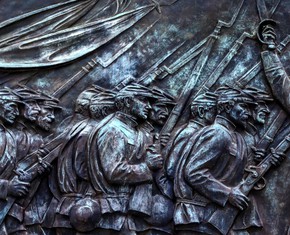The views expressed in our content reflect individual perspectives and do not represent the authoritative views of the Baha'i Faith.
The Baha’i teachings offer humanity a great gift with their clarification of the meanings in the sacred Judeo-Christian scriptures — and the fulfillment of their promises and prophecies.
As just one example, the Baha’i revelation explains and fulfills Christ’s remarkable promise in the Gospel of John: “When He, the Spirit of truth has come, He will guide you into all truth.”
To see how God promises and fulfills the appearance of a new holy messenger, let’s look at a promise in the Hebrew Bible and its fulfillment in the Gospel. In the following words spoken by God to Moses, we see the terminology God uses to promise the appearance of a future prophet, describing the relationship between that prophet and the Deity. The Book of Deuteronomy, verse 18:18 says: “I will raise up for them a Prophet like you from among their brethren, and will put My words in His mouth, and He shall speak to them all that I command Him.”
RELATED: Exploring the Transformative Power of the Word of God
Observe the relationship here between the Creator and His prophet: God will put His words into the prophet’s mouth, and the prophet will speak as God commands. This verse from Deuteronomy is understood by Christians to be a prophecy of Jesus Christ. Look at how the prophet is foretold in that verse, and compare it to these words of Jesus Christ from John 12:49-50, fulfilling that prophecy and describing the source of Christ’s revelation:
For I have not spoken on my own authority; but the Father who sent Me gave Me command, what I should say and what I should speak. And I know that His command is everlasting life. Therefore, whatever I speak, just as the Father has told Me, so I speak.
Comparing these verses, Jesus confirmed that his relationship to God the Father is exactly as prophesied in Deuteronomy — That God puts His words in Jesus’ mouth and commands Christ what to say.
Now let’s compare this prophecy by Jesus about the one to come after him, revealed in John 16:13 in the exact same spirit:
However, when He, the Spirit of truth has come, He will guide you into all truth; for He will not speak on His own authority, but whatever He hears He will speak; and He will tell you things to come. He will glorify Me …
In the Baha’i teachings, Abdu’l‑Baha interprets these words of Jesus, stating:
Now consider carefully that from these words, ’for He shall not speak of Himself; but whatsoever He shall hear, that shall He speak,’ it is clear that the Spirit of truth is embodied in a Man Who has individuality, Who has ears to hear and a tongue to speak.
The Spirit of Truth, then, is a person, not only the appearance of the Holy Spirit inspiring the disciples at Pentecost.
Baha’u’llah wrote in his Tablet to the Christians that he has fulfilled this prophetic promise:
Verily, He Who is the Spirit of Truth is come to guide you unto all truth. He speaketh not as prompted by His own self, but as bidden by Him Who is the All‑Knowing, the All‑Wise. Say, this is the One Who hath glorified the Son and hath exalted His Cause.
Shoghi Effendi, the Guardian of the Baha’i Faith, said that Baha’u’llah has fulfilled this covenant made by Jesus Christ:
… in several passages addressed to the entire body of the followers of Jesus Christ [Baha’u’llah] identifies Himself with the “Father” spoken of by Isaiah, with the “Comforter” Whose Covenant He Who is the Spirit (Jesus) had Himself established, and with the “Spirit of Truth” Who will guide them “into all truth”…
Shoghi Effendi also wrote:
Did not Christ Himself, addressing His disciples, utter these words: ’I have yet many things to say unto you, but ye cannot bear them now. Howbeit when He, the Spirit of Truth, is come, He will guide you into all truth’? From … the words of Christ, as attested by the Gospel, every unprejudiced observer will readily apprehend the magnitude of the Faith which Baha’u’llah has revealed, and recognize the staggering weight of the claim He has advanced …
Ours is the duty to ponder these things in our heart, to strive to widen our vision, and to deepen our comprehension of this Cause, and to arise, resolutely and unreservedly, to play our part, however small, in this greatest drama of the world’s spiritual history.
Baha’u’llah revealed this passage in his last great work, addressed to a Muslim clergyman who persecuted the Baha’i community in 19th-century Persia:
Briefly, in the sayings of Him Who is the Spirit (Jesus) unnumbered significances lie concealed. Unto many things did He refer, but as He found none possessed of a hearing ear or a seeing eye He chose to conceal most of these things. Even as He saith: “But ye cannot bear them now.” That Dawning-Place of Revelation saith that on that Day He Who is the Promised One will reveal the things which are to come. Accordingly in the [Most Holy Book], and in the Tablets to the Kings … most of the things which have come to pass on this earth have been announced and prophesied by the Most Sublime Pen.
What did Jesus Christ say that he could have revealed but humanity could not then bear? What new teachings have Baha’u’llah brought that are not in the Gospel?
While Christ addressed the Gospel to the individual and did not provide specific guidance in the conduct of international relations, the revelation of Baha’u’llah offers divine guidance intended to unify the peoples and nations of the world. Shoghi Effendi wrote that the Baha’i Faith’s “… message is applicable not only to the individual, but concerns itself primarily with the nature of those essential relationships that must bind all the states and nations as members of one human family.”
Among the many examples of such guidance from Baha’u’llah’s new revelation are his tablets to the monarchs and rulers of his day, first collectively in his Tablet to the Kings. Later Baha’u’llah addressed several individual monarchs, including his Tablet to Queen Victoria, which includes his guidance to the monarchs of the Earth to establish collective security:
O rulers of the earth! Be reconciled among yourselves, that ye may need no more armaments save in a measure to safeguard your territories and dominions. Beware lest ye disregard the counsel of the All-Knowing, the Faithful. Be united, O kings of the earth, for thereby will the tempest of discord be stilled amongst you, and your peoples find rest, if ye be of them that comprehend. Should any one among you take up arms against another, rise ye all against him, for this is naught but manifest justice.
RELATED: Becoming Myself: the Independent Investigation of Truth
Christ’s guidance on one’s conduct toward an enemy urges us to show kindness, to return good for evil done, to turn the other cheek, and to “put up the sword.” Today, however, such conduct by a head of state towards an aggressor nation would be counterproductive. Baha’u’llah’s guidance for the combined nations of the world is to rise up against any government that threatens peace — using collective economic or military force. Jesus addressed the individual, while Baha’u’llah addressed the nations as well as the individual.
If you’d like more information about the Baha’i plan for global peace, you’ll find Baha’u’llah’s guidance on establishing peace summarized in the remarkable 1985 message addressed to the peoples of the world by the Universal House of Justice — called The Promise of World Peace.
















Comments
Sign in or create an account
Continue with Googleor